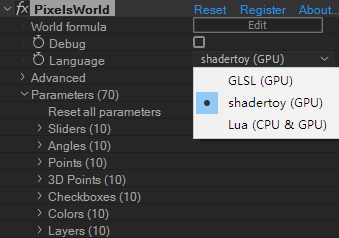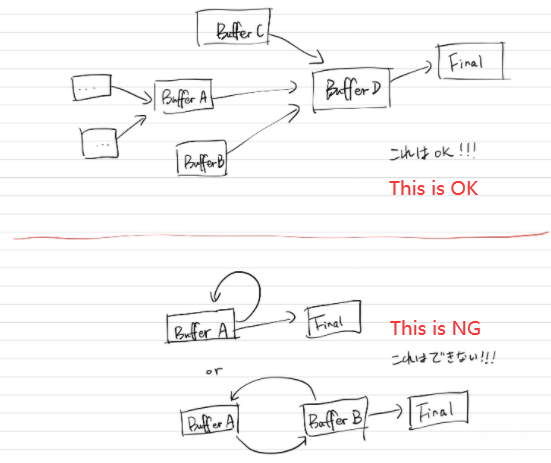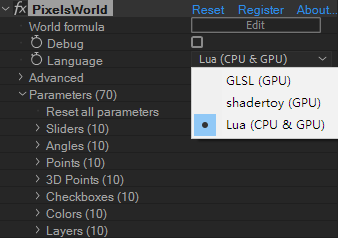模板圣域shadertoy
用法
在此模式下,你可以直接使用来自 shadertoy.com的代码。

注意
并非所有来自 shadertoy.com的代码均可在PixelsWorld下完美运行 (比如带有音频输入、需要VR支持和含有循环Buffer引用的代码)

细节
如果您想在shadertoy模式下自有调用参数面板,请把所有GLSL模式下的变量加上_PixelsWorld_前缀即可使用。
比如在GLSL模式下的
slider[0]将变成_PixelsWorld_slider[0]
参考这里来了解所有全局变量的定义。
当然在shadertoy模式下我们不推荐您自己定义带有_PixelsWorld_前缀的变量。
使用Buffers
Shadertoy自带4个Buffers,在PixelsWorld中也可以实现Buffers。
非循环式Buffers

如果你使用的特效没有循环Buffers之间的循环调用(如上图的下半部分)。那么你的特效中的Buffers属于非循环式Buffers。你可以用如下代码模板调用它们(注意:需要切换到Lua模式)。
例如来自:https://www.shadertoy.com/view/4dVGRW 的代码:
- 这个效果使用了
BufferA,所以下面的代码在第四行把A设为了true。 BufferA在最终被绑定到Main图像的iChannel0上,所以下面代码在15行把AtoMain设为0。- 然后,把
BufferA和Main的代码分别复制到相应变量上即可。 - 最后,为了计算结果正确,你需要将插件面板上的
Advanced->Internal texture format设为Floating point 32 bit x RGBA (HDR)来阻止PixelsWorld在内部削平Alpha通道的数值。 - 确保你在Lua渲染模式下。
rotatingCubes.lua
version3()
enable = {
A=true,
B=false,
C=false,
D=false,
-- '-1': disable
-- '0~3': which iChannel to set
AtoB = -1,
AtoC = -1,
AtoD = -1,
AtoMain = 0,
BtoC = -1,
BtoD = -1,
BtoMain = -1,
CtoD = -1,
CtoMain = -1,
DtoMain = -1,
}
mainCode = [==[
// Paste the main code here.
mat3 calcLookAtMatrix(vec3 origin, vec3 target, float roll) {
vec3 rr = vec3(sin(roll), cos(roll), 0.0);
vec3 ww = normalize(target - origin);
vec3 uu = normalize(cross(ww, rr));
vec3 vv = normalize(cross(uu, ww));
return mat3(uu, vv, ww);
}
vec3 getRay(vec3 origin, vec3 target, vec2 screenPos, float lensLength) {
mat3 camMat = calcLookAtMatrix(origin, target, 0.0);
return normalize(camMat * vec3(screenPos, lensLength));
}
vec2 squareFrame(vec2 screenSize, vec2 coord) {
vec2 position = 2.0 * (coord.xy / screenSize.xy) - 1.0;
position.x *= screenSize.x / screenSize.y;
return position;
}
vec2 getDeltas(sampler2D buffer, vec2 uv) {
vec2 pixel = vec2(1. / iResolution.xy);
vec3 pole = vec3(-1, 0, +1);
float dpos = 0.0;
float dnor = 0.0;
vec4 s0 = texture(iChannel0, uv + pixel.xy * pole.xx); // x1, y1
vec4 s1 = texture(iChannel0, uv + pixel.xy * pole.yx); // x2, y1
vec4 s2 = texture(iChannel0, uv + pixel.xy * pole.zx); // x3, y1
vec4 s3 = texture(iChannel0, uv + pixel.xy * pole.xy); // x1, y2
vec4 s4 = texture(iChannel0, uv + pixel.xy * pole.yy); // x2, y2
vec4 s5 = texture(iChannel0, uv + pixel.xy * pole.zy); // x3, y2
vec4 s6 = texture(iChannel0, uv + pixel.xy * pole.xz); // x1, y3
vec4 s7 = texture(iChannel0, uv + pixel.xy * pole.yz); // x2, y3
vec4 s8 = texture(iChannel0, uv + pixel.xy * pole.zz); // x3, y3
dpos = (
abs(s1.a - s7.a) +
abs(s5.a - s3.a) +
abs(s0.a - s8.a) +
abs(s2.a - s6.a)
) * 0.5;
dpos += (
max(0.0, 1.0 - dot(s1.rgb, s7.rgb)) +
max(0.0, 1.0 - dot(s5.rgb, s3.rgb)) +
max(0.0, 1.0 - dot(s0.rgb, s8.rgb)) +
max(0.0, 1.0 - dot(s2.rgb, s6.rgb))
);
dpos = pow(max(dpos - 0.5, 0.0), 5.0);
return vec2(dpos, dnor);
}
void mainImage(out vec4 fragColor, in vec2 fragCoord) {
vec3 ro = vec3(sin(iTime * 0.2), 1.5, cos(iTime * 0.2)) * 5.;
vec3 ta = vec3(0, 0, 0);
vec3 rd = getRay(ro, ta, squareFrame(iResolution.xy, fragCoord.xy), 2.0);
vec2 uv = fragCoord.xy / iResolution.xy;
vec4 buf = texture(iChannel0, fragCoord.xy / iResolution.xy);
float t = buf.a;
vec3 nor = buf.rgb;
vec3 pos = ro + rd * t;
vec3 col = vec3(0.5, 0.8, 1);
vec2 deltas = getDeltas(iChannel0, uv);
if (t > -0.5) {
col = vec3(1.0);
col *= max(0.3, 0.3 + dot(nor, normalize(vec3(0, 1, 0.5))));
col *= vec3(1, 0.8, 0.35);
}
col.r = smoothstep(0.1, 1.0, col.r);
col.g = smoothstep(0.1, 1.1, col.g);
col.b = smoothstep(-0.1, 1.0, col.b);
col = pow(col, vec3(1.1));
col -= deltas.x - deltas.y;
fragColor = vec4(col, 1);
}
]==];
commonCode = [==[
// Paste the common code here.
]==]
bufferACode = [==[
// Paste the Buffer A code here.
float sdBox( vec3 p, vec3 b ) {
vec3 d = abs(p) - b;
return min(max(d.x,max(d.y,d.z)),0.0) +
length(max(d,0.0));
}
vec2 mirror(vec2 p, float v) {
float hv = v * 0.5;
vec2 fl = mod(floor(p / v + 0.5), 2.0) * 2.0 - 1.0;
vec2 mp = mod(p + hv, v) - hv;
return fl * mp;
}
vec2 rotate2D(vec2 p, float a) {
return p * mat2(cos(a), -sin(a), sin(a), cos(a));
}
float map(vec3 p) {
float r = iMouse.z > 0.0 ? iMouse.x / 100.0 : iTime * 0.9;
p.xz = mirror(p.xz, 4.);
p.xz = rotate2D(p.xz, r);
float d = sdBox(p, vec3(1));
d = min(d, sdBox(p, vec3(0.1, 0.1, 3)));
d = min(d, sdBox(p, vec3(3, 0.1, 0.1)));
return d;
}
mat3 calcLookAtMatrix(vec3 origin, vec3 target, float roll) {
vec3 rr = vec3(sin(roll), cos(roll), 0.0);
vec3 ww = normalize(target - origin);
vec3 uu = normalize(cross(ww, rr));
vec3 vv = normalize(cross(uu, ww));
return mat3(uu, vv, ww);
}
vec3 getRay(vec3 origin, vec3 target, vec2 screenPos, float lensLength) {
mat3 camMat = calcLookAtMatrix(origin, target, 0.0);
return normalize(camMat * vec3(screenPos, lensLength));
}
float calcRayIntersection(vec3 rayOrigin, vec3 rayDir, float maxd, float precis) {
float latest = precis * 2.0;
float dist = +0.0;
float type = -1.0;
float res = -1.0;
for (int i = 0; i < 30; i++) {
if (latest < precis || dist > maxd) break;
float result = map(rayOrigin + rayDir * dist);
latest = result;
dist += latest;
}
if (dist < maxd) {
res = dist;
}
return res;
}
vec2 squareFrame(vec2 screenSize, vec2 coord) {
vec2 position = 2.0 * (coord.xy / screenSize.xy) - 1.0;
position.x *= screenSize.x / screenSize.y;
return position;
}
vec3 calcNormal(vec3 pos, float eps) {
const vec3 v1 = vec3( 1.0,-1.0,-1.0);
const vec3 v2 = vec3(-1.0,-1.0, 1.0);
const vec3 v3 = vec3(-1.0, 1.0,-1.0);
const vec3 v4 = vec3( 1.0, 1.0, 1.0);
return normalize( v1 * map( pos + v1*eps ) +
v2 * map( pos + v2*eps ) +
v3 * map( pos + v3*eps ) +
v4 * map( pos + v4*eps ) );
}
vec3 calcNormal(vec3 pos) {
return calcNormal(pos, 0.002);
}
void mainImage(out vec4 fragColor, in vec2 fragCoord) {
vec2 uv = squareFrame(iResolution.xy, fragCoord.xy);
vec3 ro = vec3(sin(iTime * 0.2), 1.5, cos(iTime * 0.2)) * 5.;
vec3 ta = vec3(0, 0, 0);
vec3 rd = getRay(ro, ta, uv, 2.0);
float t = calcRayIntersection(ro, rd, 20.0, 0.001);
vec3 pos = ro + rd * t;
vec3 nor = calcNormal(pos);
fragColor = vec4(nor, t);
}
]==];
bufferBCode = [==[
// Paste the Buffer B code here.
]==];
bufferCCode = [==[
// Paste the Buffer C code here.
]==];
bufferDCode = [==[
// Paste the Buffer D code here.
]==];
-- == WARNING WARNING WARNING WARNING WARNING == --
-- == Code below this line should not be modified. == --
-- Code By ZzStarSound
-- This preset code should only be used inside PixelsWorld.
-- Any abusing of the code is not permitted.
swapTexDet = function(sch,tch)
if sch == nil or tch == nil then return end
if sch >= 0 and sch <= 3 then
swapTex(sch,tch)
end
end
if enable.A then
texA = newTex(width,height)
shadertoy(commonCode .. bufferACode)
swapTex(texA,OUTPUT)
end
if enable.B then
texB = newTex(width,height)
swapTexDet(enable.AtoB,texA)
shadertoy(commonCode .. bufferBCode)
swapTexDet(enable.AtoB,texA)
swapTex(texB,OUTPUT)
end
if enable.C then
texC = newTex(width,height)
swapTexDet(enable.AtoC,texA)
swapTexDet(enable.BtoC,texB)
shadertoy(commonCode .. bufferCCode)
swapTexDet(enable.AtoC,texA)
swapTexDet(enable.BtoC,texB)
swapTex(texC,OUTPUT)
end
if enable.D then
texD = newTex(width,height)
swapTexDet(enable.AtoD,texA)
swapTexDet(enable.BtoD,texB)
swapTexDet(enable.CtoD,texC)
shadertoy(commonCode .. bufferDCode)
swapTexDet(enable.AtoD,texA)
swapTexDet(enable.BtoD,texB)
swapTexDet(enable.CtoD,texC)
swapTex(texD,OUTPUT)
end
swapTexDet(enable.AtoMain,texA)
swapTexDet(enable.BtoMain,texB)
swapTexDet(enable.CtoMain,texC)
swapTexDet(enable.DtoMain,texD)
shadertoy(commonCode .. mainCode)
swapTexDet(enable.AtoMain,texA)
swapTexDet(enable.BtoMain,texB)
swapTexDet(enable.CtoMain,texC)
swapTexDet(enable.DtoMain,texD)
循环式Buffer
嗯...如果你想用的效果是循环Buffer,我们十分不推荐在PixelsWorld中使用它们。(不过这依然是可以实现的,您需要做好跟Ae及PixelsWorld苦斗一夜的准备,我准备好了>>>)